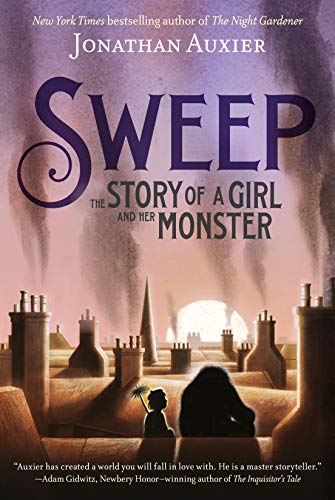![]() Sweep: The Story of a Girl and Her Monster by Jonathan Auxier
Sweep: The Story of a Girl and Her Monster by Jonathan Auxier
 Sweep: The Story of a Girl and Her Monster (2018), by Jonathan Auxier, is a wonderfully, bittersweetly poignant MG/YA book that I highly recommend for its warmth and gentle eloquence.
Sweep: The Story of a Girl and Her Monster (2018), by Jonathan Auxier, is a wonderfully, bittersweetly poignant MG/YA book that I highly recommend for its warmth and gentle eloquence.
Set in Victorian England, Auxier’s Dickensian story focuses on young chimneysweep Nan, who grew up mentored in the field by The Sweep. When he disappears one night though, all Nan has left from him are his hat, her skills, and on odd lump of charcoal. Nan spends the next few years in indentured employment to the cruel, abusive Wilkie Crudd, but a near-fatal flue fire changes her life forever as she finds herself free of Crudd and a mentor herself, albeit to a child-like golem named Charlie rather than another chimneysweep.
There’s so much to love about Sweep, beginning with the main character. Nan is sharp, lively, wise beyond her years, and compassionate, a creature of loss and aching desire. It’s impossible not to root for her or be moved by her experiences. Charlie, meanwhile, has the vulnerability of a child as well as a child’s curiosity and generosity. The Sweep, who comes to us in flashbacks via interstitial chapters told in a sort of fairy-tale/folk-tale mode is a warm, gentle mentor to young Nan, able to find magic in the mundane and hope in a bleak world. (He reminded me a bit of the Roberto Benigni’s character in Life is Beautiful for those who know that film.) He’s nicely paralleled in real time by a young schoolteacher who takes an interest in Nan, piqued by the chimneysweep’s obvious intelligence. The teacher could have been a stock “nice adult” character, but she’s made more interesting and complex by her halting attempts to re-familiarize herself with her Jewish heritage. Crudd, therefore, is the only character I would describe as “stock,” but he’s so perfectly Dickensian, so fitting for the setting, that it didn’t bother me at all.

Jonathan Auxier
The plot is relatively simple, but the story is rich. First, Auxier does not romanticize the life of chimneysweeps; far from it. Instead readers are witness to its dangers (including lethal ones), its appalling conditions, its starvation “wages,” and the way indentured service was slavery in all but name. Auxier also highlights issues of anti-Semitism, class inequality/exploitation, sexism, and early attempts at social protest. Themes of loss, friendship, empathy, and lost innocence create a deeply emotional tapestry, and Auxier intersperses darkly bleak scenes with moments of sparkling beauty and intimacy: the fall of new snow, the hatching of a bird, the gift of a friend. A more sophisticated layer of literary allusion comes in via references to William Blake (both directly to his texts in the story itself and in the segment titles of the novel), Mary Shelley, and others. This English teacher also loves how those work not simply as allusions but also serve to demonstrate the power of literature to broaden one’s eyes and inspire action. Finally, Auxier builds in a strong sense of urgent tension by an early note that golems (Charlie) are ephemeral creatures — existing only for a particular mission and then dying once that mission is done.
Stylistically, Sweep is perfectly paced, fluid, well-constructed and structured, and the prose is simple and direct, even fierce, as needed, but also can turn lyrical and lovely at necessary moments.
I’ve been on a bad run of books the past week or two, and Sweep was just what I needed to clear out the bad taste. Engaging, compelling, moving to the point of lump-in-the-throat moments, and drawing to a perfect close. An excellent MG book, but I’d also recommend it to older YA readers and also as a read-aloud for younger readers thanks to its easy pace, simple plot, rich emotionality, and strong moral themes. Just an overall excellent piece of work.



Wow, this sounds wonderful!
It really is